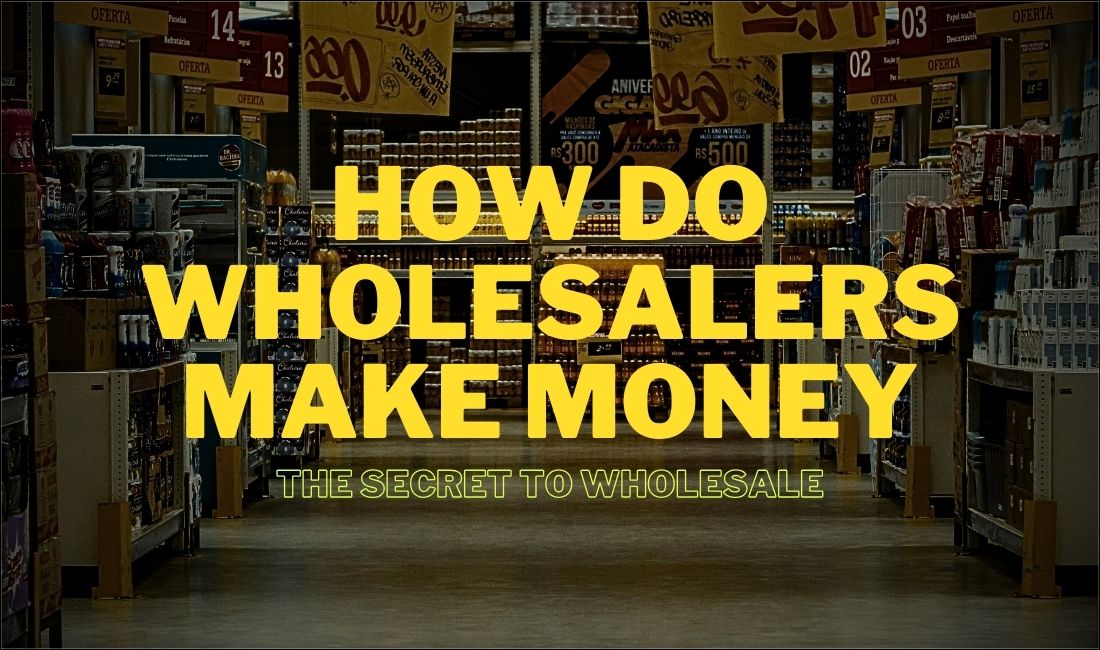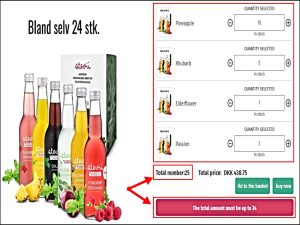
When you think about the supply chain, you have the manufacturers making the product and the stores that sell the product. However, the middleman’s curious case connects the supply chain’s two ends: the wholesalers.
In just the United States alone, the cost of sales sold by merchant wholesalers totaled over 8 trillion USD, of which 2.3 trillion USD is in eCommerce, according to Statista. This is not even a worldwide statistic and is valued that much.
So, exactly how do wholesalers make money in the middle of the supply chain? In this article, I will go over how wholesalers make their money and how the different types of wholesalers also make their money. Additionally, I will talk about how you can enhance your online wholesaling business.
How Do Wholesalers Make Money? – 3 Ways Unveiled
Wholesalers make their money in 3 primary principles: procurement, storage, and distribution. But there is more to wholesaling than just this, so let’s look at the 3 ways that wholesalers make money:
Way#1 Bulk Purchasing And Marked-Up Sales
Bulk purchasing and marked-up sales are how all wholesalers make their money. Wholesalers are positioned in the supply chain where they have the negotiating power to buy products in bulk at heavily discounted prices. Wholesalers have contact with manufacturers and purchase the product from them. That is the procurement process of wholesaling.
After that, they break up the bulk and resell it to retailers. The advantage this creates for wholesalers is that it is not in bulk anymore, so retailers cannot buy at discounted prices. Thus, the prices are marked up for sales, and that is what retailers have to pay to get them. Wholesalers profit from what they pay the manufacturers to buy the products.
Way#2 Managing And Shipping Products
The next way that wholesalers make money is by managing and shipping the products to retailers. Inventory management is a vital component of wholesaling, and wholesalers take care of it for retailers. They do B2B inventory and order tracking, replenish inventory, and sometimes store inventory for retailers. The retailers have to pay for managing and storing in warehouses.
And of course, let’s not forget that wholesalers must also ship the products to retailers. This is another way wholesalers make money as they take care of the shipping logistics and ensure retailers get their products on time. Retailers pay for the shipping price, and wholesalers make money by delivering the product to retailers.
Way#3 Value-Added Services
While the other two are the primary jobs of wholesalers, value-added services are what wholesalers do as extra services for their customers. Wholesalers add value and make money through services like marketing campaigns, real-time order tracking, personalization, and risk-bearing costs.
These types of services are not something all businesses require. However, these services are what add to what the wholesalers provide. Some wholesalers can focus primarily on procurement and shipping the products, while others focus on helping their clients in other ways to make money for the services they provide.
How 7 Types Of Wholesalers Make Money
Now that we have determined how wholesalers make money let’s look at how different types of wholesalers make money:
Type#1 Merchant Wholesalers
Merchant wholesalers are probably the most common type of wholesalers. They do the essential wholesaler job of buying products from manufacturers and then selling them to retailers. A merchant wholesaler does a lot more than just buying and selling. They take ownership of the products they sell, manage inventory, and handle distribution from the producers to the end-point sellers or retailers. It offers the convenience and efficiency of moving products into customers’ hands.
Type#2 Agent Wholesalers
Much like merchant wholesalers, agent wholesalers sell just about everything for retailers but don’t own their products. Think of agent wholesalers as selling products on behalf of the manufacturers. How the agent wholesaler makes money is based on commissions of sales. Agent wholesalers are just as typical as merchant wholesalers for fast-moving consumer goods (FMCG) and help manufacturers get their products to store shelves.
Type#3 Full-Service Wholesalers
While agent and merchant wholesalers can be considered more general, full-service wholesalers go above and beyond just selling the product. They offer their customers a comprehensive range of services, including product categorization and selection assistance, marketing support, inventory management, and logistics solutions.
Along with selling the products, this is how these types of wholesalers make money. Full-service wholesalers aim to build strong partnerships with retailers and businesses. Helping businesses optimize their operations and maximize sales potential with these services benefits all parties involved.
Type#4 Limited Service Wholesalers
In contrast to full-service wholesalers, limited-service wholesalers offer a more streamlined approach to wholesale operations. They still sell products in bulk quantities but provide fewer additional services to their customers. Limited service wholesalers focus primarily on the transactional aspect of wholesaling, concentrating on efficient order processing and delivery. While this might seem lacking, not all vendor relationships need full-service wholesalers’ services. Instead, focusing on more concentrated efforts to optimize bulk buying, selling, and distribution is what a limited-service wholesaler does best.
Type#5 Specialized Wholesalers
Now, let’s talk about specialized wholesalers. They are the middle ground between full-service wholesalers and limited-service wholesalers. But they specialize in a specific niche, industry, or wholesaling one product or service. They offer a curated selection of products tailored to their target customers’ unique needs and preferences.
This gives a deeper understanding of business practices that, in turn, create deep relationships with suppliers and buyers. That is how specialized wholesalers can seamlessly fit into the wholesaling business model.
Type#6 eCommerce Wholesalers
While all the wholesalers I have mentioned so far have all been about catering to brick-and-mortar stores, there is a subsection of wholesalers that deal with what is known as online or eCommerce wholesaling. These types of wholesalers primarily operate through online channels. These wholesalers reach customers via online marketing strategies and serve as a convenient place to bulk order products.
eCommerce wholesalers provide features such as streamlined order processing, secure payment options, and real-time inventory updates. eCommerce wholesalers also have the advantage of selling digital products for stores, which is rather difficult for a physical store.
Type#7 Drop Ship Wholesalers
Now, we can’t talk about eCommerce wholesaling without discussing the most popular type: drop ship wholesalers. Think of agent wholesalers who hold no inventory and directly ship the product to customers. When a retailer receives an order from a customer, they forward it to the drop ship wholesaler. Then, the wholesaler ships the product directly to the customer on behalf of the retailer.
This model eliminates the need for retailers to invest in inventory storage and management, providing a cost-effective solution for online businesses that are not equipped to handle storage. The retail price of the product is the cost of the wholesale price set by the retailer plus the extra that would be profit from them. So the wholesaler gets the money they were looking for, the retailers get the profit they want, and the customer buying the product gets it.
Transforming Your Shopify Wholesaling Business To New Heights With A Bulk Order App
The pandemic showed that the eCommerce market has the potential to keep growing. The wholesale market is noticing that, so there are so many more eCommerce wholesalers than ever before. But how do you differentiate yourself from the competition?
On an eCommerce platform like Shopify, there is the Shopify app store. Here, storeowners can find third-party applications to enhance the shopping experience for new clients. A better shopping experience can lead to potential customers becoming loyal customers. Here is an example of a Shopify store using a bulk order mix-and-match bundle app with MOQ restrictions to help that:

The app lets this store owner showcase all bundle variants on one store page. Here, the customer can mix and match the variants they want in the bundle and even select the quantity of each variant. The app also shows an inventory stock badge to let customers know if they have the product.
Next, we see the total quantity selected and the maximum quantity order restriction. There might be 25 variants selected for a 24-bundle product, but there is a warning for the customers to let them know they are over the limit. Only when 24 products are chosen, does the app allow the product to be added to the cart.
MOQ is very important for wholesale as you can have either maximum or minimum orders for your products. This will allow your shop to maintain higher profit margins while ensuring you sell the correct amount for customers. It makes the shopping experience more optimized and smoother for customers and ensures that your store sells the proper amount. Overall, your customers are happy, and your profit margins can be maintained with the MOQ restrictions.
Bottom Line
Different wholesalers make money differently. Some focus on bulk buying and selling, while others focus on value-added storage for clients. Regardless, all wholesalers are the middlemen in the supply chain between manufacturers and retailers. They have to do that while ensuring profit margins are maintained. I hope that with this, you better understand how wholesalers make money from buying and selling.
